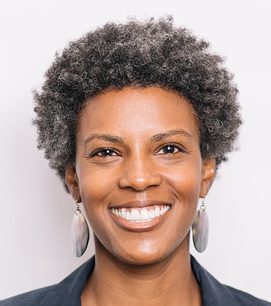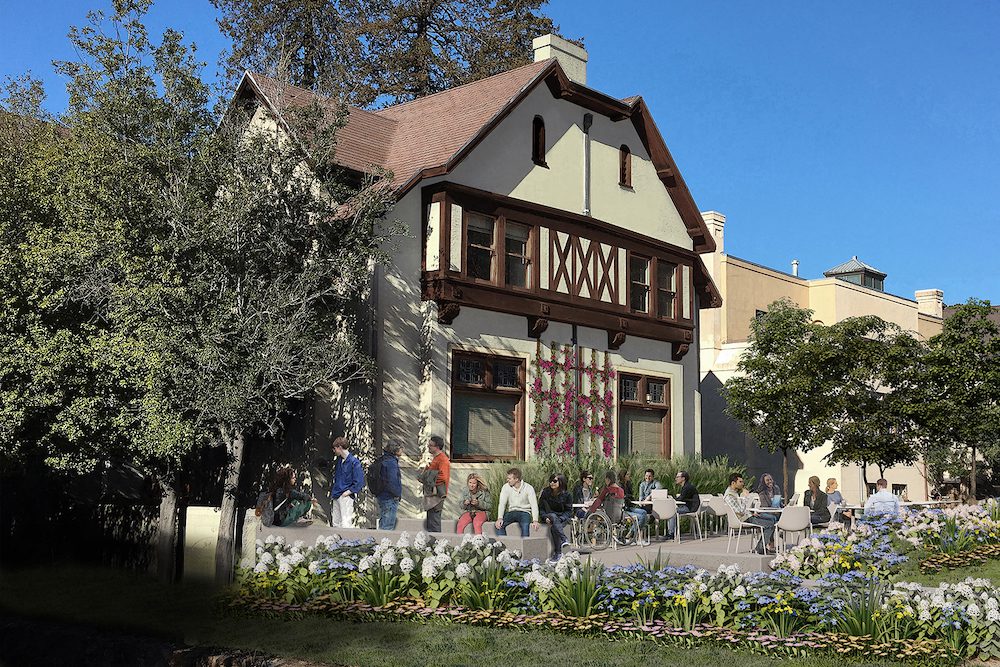Dawn McGee has loved entrepreneurship since she was a kid “playing company” with family and friends.

That love, anchored by the belief that business should benefit society, turned into her career. As the executive director of the new Berkeley Haas Entrepreneurship Hub (eHub), set to open this fall on Piedmont Avenue just steps away from Haas, McGee, along with eHub Faculty Director Saikat Chaudhuri, will help shepherd startup ideas from the next generation of Haas and Berkeley students. For McGee, that group includes novices who previously held no interest in the startup world to students who are well on their way to building a company.
The eHub, housed in an elegant Julia Morgan-designed building that’s been fully renovated, promises to be a haven for students to connect, build, and be discovered. In this interview, McGee, who joined Haas from UC Davis, where she co-led the Student Startup Center, discussed programming plans and UC Berkeley’s important role in the innovation ecosystem.
First of all, the new eHub building is beautiful. Can you talk about your role there and how you’ll be working with students?
My number one job right now is to market the eHub and to get students involved. Next, we’ll focus on amplifying what already exists. There is a wealth of innovation and entrepreneurship resources on Berkeley’s campus—so many colleagues are doing so many things well. So the first programming task is to connect students to those resources through the eHub Navigator, who is a member of our team. Any student on campus can visit the Navigator to get help planning their unique entrepreneurship journey. The Navigator will learn about you and your aspirations, and then they’ll help you figure out what the next steps and right resources are for you.
What interested you in entrepreneurship as a kid?
Very early on, I had this idea that business was about being of service. I was a young child who loved designing business models. And my key partners were always friends and family members, so I could design their business models, too.
When I was in my 20s working for startups, I was introduced to the idea of social entrepreneurship by my brother, who was an Echoing Green fellow. I worked with him to build his organization’s vision,and I loved it. His venture was extra special because its ultimate impact was to help people create change in their lives. I’ve supported a variety of profit-driven entrepreneurs, and I enjoy the exercise of developing founders and helping them to develop their businesses. But personally, I am most passionate about social entrepreneurship.

How will the eHub programming support innovation and entrepreneurship?
We will host events that engage students in practicing entrepreneurship and events that are built for community building. We’re designing micro-communities around students’ interests and their stage within their entrepreneurship journey. We’ll also provide data-driven matchmaking to help students meet the right people.
For those who want to build something, we will offer an eHub membership, which requires a small weekly time commitment. These low-commitment programs are designed to get students started, and then we’ll keep you moving until that next right resource is available.
How will the tracks work?
We have three tracks: SEARCH, TEST, and BUILD.
In the SEARCH track, students will look for a problem worth solving—something that’s meaningful enough that it motivates them to do the work required of an entrepreneur. Then, they’ll brainstorm and try to find solutions that are worth testing. Over 10 weeks, for just 50 minutes a week, they’ll use a methodology for figuring out which solutions should be at the top of their list.
The TEST track is for students who already have ideas. These students will collect a body of evidence that demonstrates that their ideas are worth investment. Every week, in 50 minutes, they’ll set up a new test of their idea. If they decide that they want to do the legwork, they’ll invest extra time to run the tests.
The BUILD track is for students who have collected sufficient evidence showing that their business model is viable, desirable, and feasible. These students will attend weekly hacking meetings with others in the BUILD track, spending two hours a week together making progress on their priorities. Students will also be matched with mentors who will help structure goals, provide advice and support, and hold their mentees accountable to their goals over the course of the semester.
You bring a wide variety of business experience to your new role, including two business degrees. Could you tell us a bit about your educational background?
I was an undergraduate at the Wharton School and studied entrepreneurial management. Then, I focused on social entrepreneurship at NYU Stern, where I got my MBA. Most recently, I’ve studied design thinking at Stanford’s d.school.
It’s great to be back to my business school roots here at Haas. I understand the language of the business school, the rhythms of the business school. It just feels more natural. And Haas is an exceptional school.
Your career has taken you in different directions, which led you back to entrepreneurship.
I’ve worked three different tracks during my career. I worked with startups as an advisor, an employee, a founder, and a board member. I’ve worked in many capacities in finance: everything from an analyst doing solvency and valuation analysis to interim treasurer of a publicly-traded company navigating bankruptcy.
Then, I moved into higher ed as a faculty member for five years, leading undergraduate and graduate students in experiential entrepreneurship education. I’ve also been a leader of entrepreneurship centers on university campuses.
So this isn’t your first time developing an entrepreneurship program?
This eHub will be my third. I directed one at a small college in Brooklyn. I was on the leadership team for four years at UC Davis’ Student Startup Center, which is where I really had the opportunity to experiment and try out a lot of different things. And now, I’m at Haas.
One thing I’ll underline about my background is that experiential education has always been really important to me. By far, the leading way for me to learn has been through experience. I am a huge advocate and champion for experiential education, and that’s one of the things that I’m excited to offer students at the eHub.
I am a huge advocate and champion for experiential education, and that’s one of the things that I’m excited to offer students at the eHub.
What excited you most about working at Berkeley Haas?
I am excited by Berkeley’s breadth of world-class research and academic programs. Students here have access to levels of knowledge that most people don’t. This allows you to solve problems at the highest of levels: you can go after the most complex problems, the ones that we have left unsolved for a long time.
Second, Berkeley resides in the capital of innovation. If you look at the dollars invested in innovation in this region and compare it to everywhere else in the world, there is no competitor.
Third, Berkeley is a leader in social mobility. One of the primary reasons I’m an entrepreneurship educator is because I’m able to transform the lives of generations of families through just one student. But doing that at a university that already has a track record of catapulting students’ economic futures? That’s really exciting.
Posted in:
Topics: